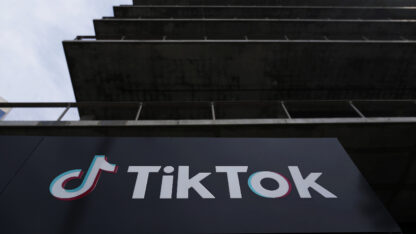One in six Georgia households will lose financial help for home internet access as federal program winds down

Without ACP benefits, hundreds of thousands of Georgians will lose an important benefit they use to access reliable broadband internet. (Toby Talbot/Associated Press)
Toby Talbot / Associated Press
Over 722,000 households in Georgia will soon lose access to a monthly assistance program used to help low-income people get online.
That’s as the federal Affordable Connectivity Program winds down due to a lack of funding, with April being the last month the program could provide participants with their full benefits.
The Federal Communications Commission launched the Affordable Connectivity Program at the end of 2021 using $14.2 billion from the bipartisan Infrastructure Investment and Jobs Act. In just two months, 10 million households were enrolled nationwide. Today, that number is about 23 million.
The ACP gave qualifying households $30 a month to purchase a home internet plan, and a one-time allowance of $100 to go towards a computer or tablet.
But earlier this year, the FCC said the program was quickly running out of funds. And unless Congress acted to extend funding through the end of the year, the program would have to shut down.
“People rely on certain things and they start building their budget around it. When you start retiring things and doing all of that, it’s not so easy for them to pivot.”
Richard Hicks, the CEO of Inspiredu, a digital equity and education nonprofit based in Atlanta
As of now, the FCC says enrolled households might get a partial benefit for May. But after that, the ball is in Congress’ court. FCC Chairwoman Jessica Rosenworcel, President Joe Biden and digital equity advocates have all urged Congress to pass legislation to extend the program.
In Georgia, the program has provided over $450 million in funding to low-income families. Georgia’s 5th Congressional District, which represents the heart of metro Atlanta, has almost 68,000 households enrolled in the benefit — around 23%.
Richard Hicks is the CEO of Inspiredu, a digital equity and education nonprofit based in Atlanta. He says the program’s end will be destabilizing for the people he works with.
“People rely on certain things and they start building their budget around it. When you start retiring things and doing all of that, it’s not so easy for them to pivot.”
In a survey conducted earlier this year, the FCC found over three-quarters of households enrolled nationwide said they will likely have to change, or simply end, their home internet service once they stop receiving ACP benefits.
About the same share of respondents say they use their ACP benefits at home to schedule healthcare appointments or do schoolwork. About half say they use it to work or apply for jobs.
That’s why having a home broadband connection, and on a computer or laptop, is so critical says Hicks. A smartphone simply can’t get the same done.
“Having a laptop device, loaded with a suite of software that builds that connection to broadband to connect you to the right resource … that gets lost.”
Hicks says digital education isn’t limited to young or old people. For example, he says adults might need help getting online to apply for social welfare benefits, like SNAP, or to view medical tests results, or do online banking.
And many learning resources for students are now delivered online as well.
“Kids need the internet, parents need the internet.”
Andrea Rowland, mother of a DeKalb County student
Andrea Rowland is an administrative assistant living in DeKalb County. She says she came to Inspiredu because her son was struggling in school and needed online tutoring. The organization helped set her and her son up with a laptop.
But she didn’t qualify for ACP benefits. Participants need to be below 200% of federal poverty guidelines or be on some form of welfare benefits.
“I had to break down and pay the [internet] company,” Rowland said, “My bill is $90 now, and that’s only because I begged them for a discount.”
“It’s ridiculous,” she continued, “kids need the internet, parents need the internet.”
Rowland hopes she and other working parents will qualify for the next broadband assistance program to come along.
“It really did not benefit the working class of people.”
Digital equity plan to address access and affordability in Georgia
As for Hicks, he is optimistic about the future. He says his group works with companies like Comcast, AT&T, Verizon and T-Mobile to negotiate a low-cost solution for Inspiredu participants, something they will keep doing even after the ACP winds down.
He thinks the push for digital equity will only continue stronger from here.
“You have a small initiative like the ACP that gives birth to a bigger initiative down the road,” said Hicks.
The Digital Equity Act of 2021 put aside $2.75 billion towards three grant programs to make sure people across the country have the skills, technology and ability to get online.
This March, the U.S. Department of Commerce’s National Telecommunications and Information Administration accepted Georgia’s Digital Equity plan to address digital access and affordability in the state.
The state hopes to achieve phase one of its plan, which includes supporting local digital connectivity programs and expanding device ownership, by the end of 2026.







